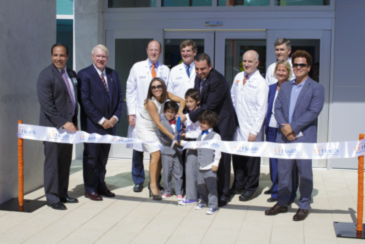UF Health Shands Children’s Hospital
In rankings released by U.S. News & World Report on June 21, the UF Health Shands Children’s Hospital is recognized as one of the nation’s 50 best hospitals for children in nine of the 10 specialties ranked. UF Health’s pediatric programs were the most-recognized in the state, and seven of the nine were the highest-rated in Florida. Two specialties (neurology and neurosurgery, and urology) were new to the list this year, joining seven other specialties also ranked last year (diabetes and endocrinology, cancer, neonatology, cardiology and heart surgery, pulmonology, nephrology and gastroenterology and gastrointestinal surgery). Moreover, six of these seven pediatric subspecialties improved their standings from 2015.
The U.S. News rankings rely on clinical data and an annual survey of pediatric specialists. A link to U.S. News & World Report provides details about the rankings. A summary of the specific UF Health pediatric services recognized by U.S. News, along with other information about the rankings, can be found here.
The improved rankings we have seen in recent years, and especially the breadth of excellence recognized this year, is especially satisfying as it reflects a commitment that began with our Forward Together strategic plan to create a world-class children’s hospital at the University of Florida. At UF Health we are combining new facilities with extraordinary faculty and staff to provide the best possible patient care experience and outcomes for children, important research breakthroughs, exceptional residency and fellowship training, and superb hospitality and service.
This newsletter will highlight some of the factors that have contributed to our success in advancing the missions of the UF Health Shands Children’s Hospital and its department of pediatrics.
In 2009, as we were developing the Forward Together strategic plan, a number of challenges facing pediatric services were identified and a commitment was made to address them. It was clear that timely access to pediatric services — from the emergency room to primary care to subspecialties — was lacking, that inpatient pediatric units were outdated and spread out across hospital facilities without a coherent identity, that pediatric research could benefit from greater depth and breadth, and that pediatric training programs would also benefit from an environment of improved facilities, patient-centered service and research.
Thus, a commitment was made to create a world-class children’s hospital at the University of Florida. Recognizing that form follows function, we developed a plan for the development of exceptional pediatric specialties housed in new facilities that would become the UF Health Shands Children’s Hospital. Important in this journey were Horst and Luisa Ferrero and the Sebastian Ferrero Foundation, who shared this vision and galvanized our community in support of this effort.

In tandem, both facilities and programs in the children’s hospital were transformed. In terms of facilities, support was enthusiastically provided by former hospital CEO Tim Goldfarb, and current CEO Ed Jimenez, to invest in the future. A new oncology unit was constructed in which inpatient and outpatient services were integrated in one contiguous space; a dedicated pediatric emergency room at the base of the children’s hospital was created that now sees about 25,000 patients per year; a state-of-the-art intensive care unit for the congenital heart program was constructed in space that was formerly used for administration; the pediatric intensive care unit was upgraded; a new façade, entry and dedicated lobby into the UF Health Shands Children’s Hospital was created with the Sebastian Ferrero Atrium; and a new and expanded neonatal intensive care unit is about to open. All of these spaces were designed with our youngest patients and their families in mind, featuring nature-themed art, elevators that travel solely to floors housing pediatric units, interactive video displays to entertain children and parents, and an overall atmosphere that clearly conveys a sense that you are in a children’s hospital dedicated to children.

Regarding the clinical and academic programs housed in these facilities, as always the excellence achieved is all about the people who have made it happen. Richard Bucciarelli, M.D., whose untimely passing in September 2015 was mourned not only by his family but also by innumerable friends, patients and generations of medical students and residents, stepped down as chair of pediatrics at UF in 2011. As stated by Scott Rivkees, M.D., who was recruited to follow Dr. Bucciarelli as chair, “Rick had the amazing ability to touch the lives of tiny infants directly in his care as a neonatologist, and touch the lives of thousands more through his amazing advocacy in pediatric public service. Rick was a leader in pediatrics, not just in Florida, but nationally.”
 Building on the foundation laid by Dr. Bucciarelli and notable previous chairs, including Drs. Terence Flotte and Douglas Barrett, Dr. Rivkees has advanced the department and children’s hospital in all mission areas. Regarding the clinical mission, he attributes the improvement in our rankings to a variety of initiatives rooted in quality improvement, some with broad application across all subspecialties, and others that pertain to specific aspects of each subspecialty. Broad initiatives included the kinds of things that might seem mundane but which make all the difference: a marked improvement in handwashing compliance, near universal vaccination rates of health care employees, reduction in central line infection rates, reduction in catheter-related urinary tract infections, improved access to care resulting in increased numbers of patients seen and reduction in time to appointment, overall maintenance of certification programs, and a commitment to UF Health’s program in hospitality and service. Specialty-specific initiatives included, for example, the expectation that all patients referred for subspecialty care be seen within five days of an appointment request. Examples of other specialty-specific initiatives include expansion of the bone marrow transplantation program, enhancement of asthma care, and a new baby friendly initiative for neonatology. The Department has also partnered with the state of Florida to help provide care to the most medically complex and the children, via the Ped-I-Care program.
Building on the foundation laid by Dr. Bucciarelli and notable previous chairs, including Drs. Terence Flotte and Douglas Barrett, Dr. Rivkees has advanced the department and children’s hospital in all mission areas. Regarding the clinical mission, he attributes the improvement in our rankings to a variety of initiatives rooted in quality improvement, some with broad application across all subspecialties, and others that pertain to specific aspects of each subspecialty. Broad initiatives included the kinds of things that might seem mundane but which make all the difference: a marked improvement in handwashing compliance, near universal vaccination rates of health care employees, reduction in central line infection rates, reduction in catheter-related urinary tract infections, improved access to care resulting in increased numbers of patients seen and reduction in time to appointment, overall maintenance of certification programs, and a commitment to UF Health’s program in hospitality and service. Specialty-specific initiatives included, for example, the expectation that all patients referred for subspecialty care be seen within five days of an appointment request. Examples of other specialty-specific initiatives include expansion of the bone marrow transplantation program, enhancement of asthma care, and a new baby friendly initiative for neonatology. The Department has also partnered with the state of Florida to help provide care to the most medically complex and the children, via the Ped-I-Care program.
These broad-based and specialty-specific quality initiatives have had material benefit. The rate of central line infections has fallen 3-fold compared with two years ago. Nearly 100 percent of our faculty receive vaccinations against influenza. Children who have cancer who seek care in our emergency room and have a fever all receive antibiotics within an hour of arrival now, another example of quality improvement measures that influence clinical care.
As always, a commitment to quality creates an environment that attracts patients and clinicians. The UF Health Shands Children’s Hospital has become the go-to place for pediatric care, both locally and throughout North Florida. Over the past several years, primary care visits annually have increased from about 40,000-45,000 to 70,000, specialty visits have increased from about 30,000-35,000 to 45,000 (with new visits increasing from 6,000 to 11,000), and hospital admissions have increased from 6,000 to 7,500.
A high-quality, busy clinical environment attracts superb researchers, graduate students and house staff, thus fostering the positive feedback loop that produces an expanding virtuous circle of patient care, research and education. As reported in J Pediatrics (2014 Dec;165(6):1076), Dr. Rivkees created and implemented a novel track-based pediatric residency program at UF Health, where trainees receive special opportunities in research, global health, public policy, general pediatrics and medical education. Resident applicants from top-third medical schools nationally have increased by 75 percent and resident graduates are matching in superb fellowship programs.
Emphasis has been placed on medical student education as well. Nationally, the department has distinguished itself by initiating the Pediatric Medical Student Research Forum, which is co-sponsored with Boston Children’s Hospital and the National Institute of Child Health and Human Development, and brings together medical students from across the country to discuss leading-edge research in pediatrics. The number of UF medical students choosing pediatric residency programs has increased from six in 2011 to 17 in 2016. Reflecting the exceptional effort devoted to medical students, the Department of Pediatrics has received the Golden Apple Award two years in a row now after a two-decade drought.
In parallel with clinical and education efforts, there has been great growth in departmental research and other scholarly activities. In part this has been achieved through the development of new research support programs that have been funded largely through Children’s Miracle Network. Reflecting the success of these programs, NIH grant support to the Department of Pediatrics has increased more than 6-fold over the past four years. Over this period of time, the number of publications has increased from about 100 reports per year to more than 500 this past year alone. Faculty members are also distinguished through leadership positions in many national societies and federal review panels.
The rise of the Department of Pediatrics and UF Health Shands Children’s Hospital to the upper echelon of pediatrics has not been a solo voyage. This journey reflects the tremendous dedication of our community and university to pediatric research, education and clinical care. We are indebted to the support of the Sebastian Ferrero Foundation, Stop Children’s Cancer, Climb for Cancer, Children’s Miracle Network and the University of Florida Dance Marathon for their tremendous support.

The field of pediatrics is all about the next generation — the children who we care for now, the discoveries that we make that will help children tomorrow and the education of physicians who care for thousands of boys and girls in the years ahead. To see such incredible growth in such a short period of time in each of the three components of our academic mission is a great tribute to the staff and faculty of the Department of Pediatrics and UF Health Shands Children’s Hospital. And it is now especially gratifying to see that these efforts are being recognized at such a high level nationally.
The Power of Together,
David S. Guzick, M.D., Ph.D. Senior Vice President for Health Affairs President, UF Health
About the author
